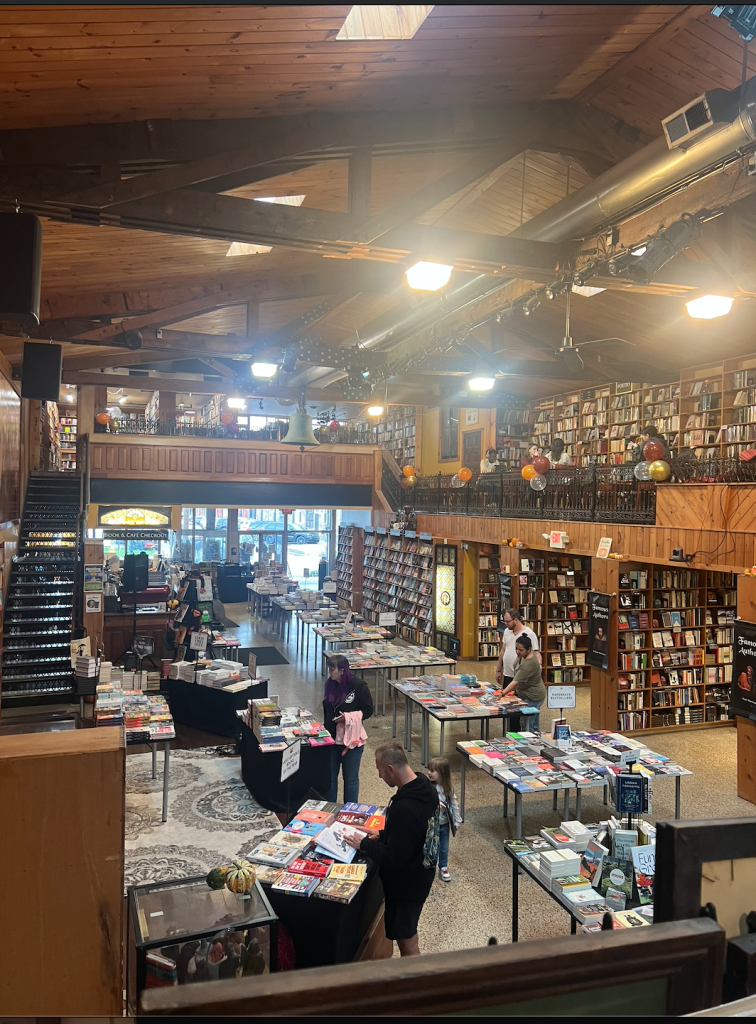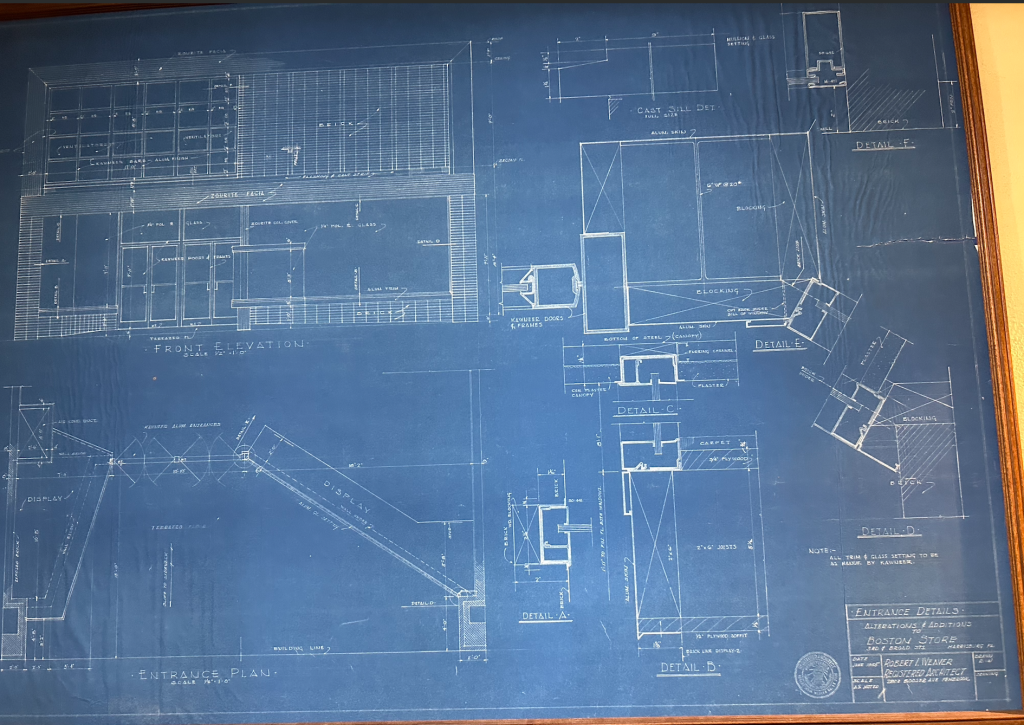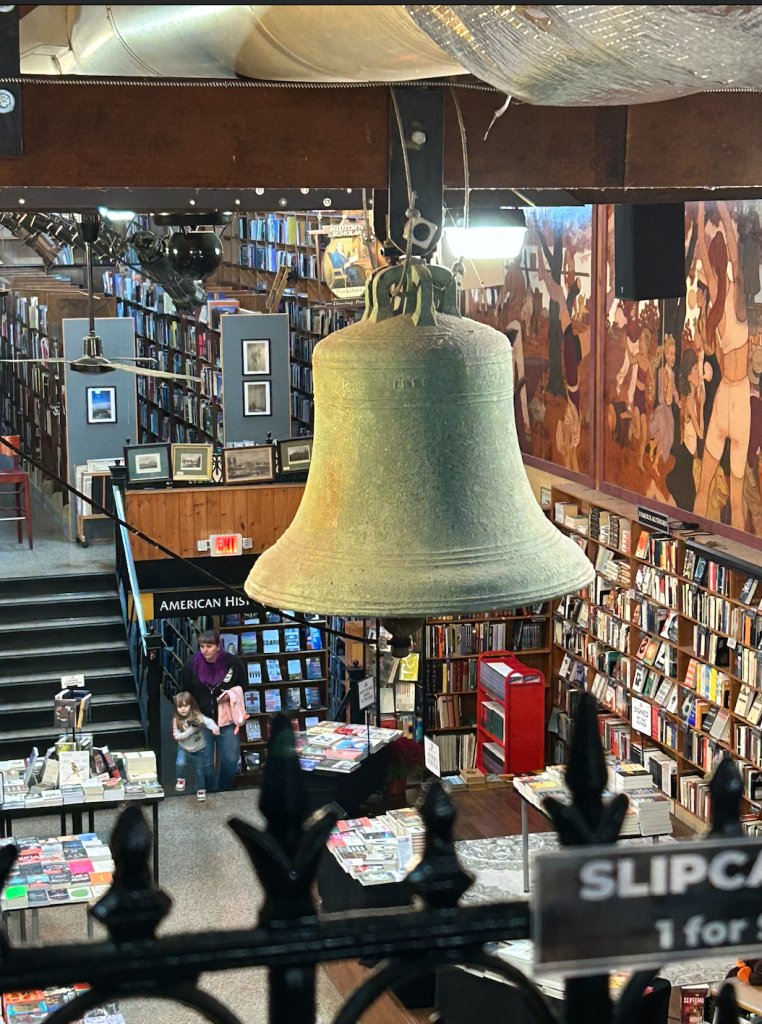Midtown Scholar: A Space in History
Many booklovers, including myself, dream of being locked in a bookstore overnight. The prospect of spending a night surrounded by literature with no responsibilities or rules is so enticing to me that I find myself looking for hiding spots every time I go to a new bookstore. As I entered Midtown Scholar Bookstore, I felt the familiar urge to lock myself within its book infused walls. However, the store itself fuels this desire by being set up as an almost “book maze” with its sprawling shelves.
The store itself spreads across three floors: the main level, the lower levels, and the balcony level.

Main Level
The entire layout of the first floor invites customers to stay and make themselves comfortable. Instead of focusing on sales and profit, the setup fosters a sense of community and gives locals a place to gather. This is exhibited heavily through the constant cycle of events held within the space. Since the store’s mission is provide the Harrisburg community with “a welcoming space for the discussion and exchange of ideas about books, politics, arts and culture, and history,” it’s no wonder the main floor is designed to be a gathering place (“Midtown Scholar Bookstore-Cafe”).
The entrance to Midtown Scholar deposits visitors directly to the front counter, which doubles as a check-out counter and café counter. The café portion of Midtown Scholar sells an assortment of coffees, teas, and pastries. By offering food and drink, the store is asking their customers to extend their visit to enjoy a treat. This is just one way the main level is a gathering place. Another example of this is the large stage that rests on the right wall of the main floor. Therefore, there is a lot of empty space directly in front of the stage to accommodate the need to set up chairs for author events. Another small gathering space present is their children’s room that is also on the main level.
Aside from the main floor acting as a gathering space, it is also where all the brand-new books are displayed. These books are organized into various sections. Near the entrance, there are two tables showcasing new bestsellers in fiction and nonfiction. To the left of these tables, are bookshelves that feature different kinds of specialty books. During my visit, they held books written by the authors who were scheduled to speak at the Harrisburg Book Festival. Another shelf held a display for “Blind Date with a Book.” Besides these shelves, there are small alcoves of books throughout the remainder of the floor. What’s interesting about these sections is that they are labeled by author. For example, there are placards marking where Mark Twain books begin and end. This makes the shopping experience convenient if you know what author wrote the book you want. Personally, when I browse a bookstore, I usually focus on the titles of the books, but this setup forced me to browse by author instead, which I found to be refreshing.
Overall, the main floor of Midtown Scholar can be described as the “commercial floor” since it is full of new books that are currently popular while also supplying a space for the public to gather.
Visitors can then decide whether to take the stairs up to the balcony or down to the lower levels.
Lower Levels
Customers can take one of two sets of staircases to visit the lower levels of Midtown Scholar which are packed with academic books. Initially, you will be greeted by the sections dedicated to history books, with American history towards the front and world history behind that. Once you’ve explored this area, you can either go to a room dedicated to rare artifacts, or you can go down another set of stairs to visit Scholar Underground. This portion of the store focuses on academic books ranging from the humanities, social sciences, religion, and culture.

The lower levels feel like a nod to Midtown Scholar’s roots as a used academic book seller. The bookshelves are jam-packed with merchandise, whether it be collectable books or historical art prints, and they are so high that it feels as if you’re in a tunnel of books. This maze of manuscripts invites visitors to lose themselves in the rich history of the store. This is obvious by how much they have preserved previous artifacts from when the space was a department store known as the Boston Store. The space blends both structural history with historical content to transport the visitor to an area that transcends time.
Balcony Level

As you ascend the stairs back to the main level, you can take one of two staircases up to the balcony level, which is devoted entirely to used books. If you decide to take the stairs to the area directly above the lower levels, you will find all things art history. As you follow the balcony along a narrow catwalk, you can browse a selection of popular fiction and poetry books that are categorized by author. Some famous people I noticed were Sylvia Plath and Rupi Kaur. This catwalk is also lined with public seating so guests can further enjoy the space. If you chose to take the other staircase behind the sales counter, you will be led to the side with all the used fiction. This area is also separated by author and all young adult books are lined along the back wall. As you continue further through this section, the collection morphs from fiction to literary criticism and eventually ends with sci-fi/fantasy books along the opposing wall. The balcony level showcases how the store has attempted to use their space as efficiently as possible. Most people would not expect to find mainstream fiction next to literary criticism, so it shows how the owners aim to jam as much material into the store as possible.
Midtown Scholar as an Accessible Space
Throughout the entirety of Pyne’s writing in “Bookshelf,” she stresses the historical importance of bookshelves by describing their history from medieval chained bookshelves all the way up to e-bookshelves (Pyne). Midtown Scholar is clearly dedicated to preserving and honoring the history of books and bookstores, while also preserving the history of the space they inhabit. This is accomplished by offering an abundance of used and rare books, while also preserving the original structure from the Boston Store.
However, by doing that, I noticed that the store itself is not as ADA-accessible as it could be. For instance, by saving the original building structure, there are no elevators, so wheelchair-users are unable to travel to the lower levels or the balcony. Therefore, limiting their shopping experience to the newer books, which are oftentimes higher priced than used options.
The article “How Bookstores are Bringing Books Within Reach,” tackles this issue head on by presenting an example of a store whose basement was a stop on the Underground Railroad. The store owner expresses the dilemma of wanting to preserve its rich history, while also making it accessible for disabled customers. Some stores have tried to combat this issue by creating add-ons like height-adjustable computer monitors and foam standing mats (op de Beeck). Therefore, I ask Midtown Scholar, are you willing to alter your history to make your store more accessible?
Text Citations
“Midtown Scholar Bookstore-Cafe.” Midtown Scholar Bookstore-Cafe, www.midtownscholar.com/. Accessed 1 Nov. 2023.
Op de Beeck, Nathalie. “How Bookstores Are Bringing Books within Reach.” Publishers Weekly, 21 July 2023.
Pyne, Lydia. Bookshelf. Bloomsbury Academic, 2019.
Photo Citations
Branche, Jessica. Main Floor. 20 Oct. 2023. Harrisburg.
Costantino, Emily. Balcony Level. 20 Oct. 2023. Harrisburg.
Costantino, Emily. Boston Store Floor Plan . 20 Oct. 2023. Harrisburg.
Floor Plan Citations
Floor plan created by Emily Costantino

0 Comments